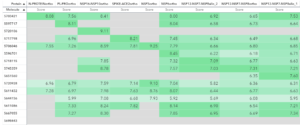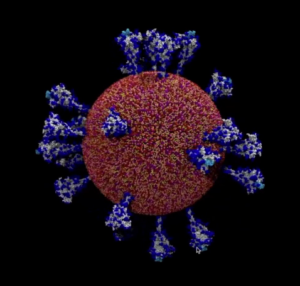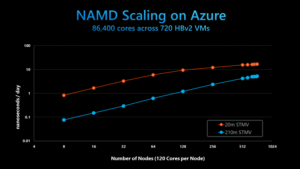Supercomputing, big data and artificial intelligence are crucial tools in the fight against the coronavirus pandemic. Around the world, researchers, corporations and governments are urgently devoting their computing resources to this global crisis. This column collects the biggest news about how advanced technologies are helping us fight back against COVID-19. At SC20, that news was on full display, and this special edition highlights the biggest COVID-19-related updates from the conference.
 The COVID-19 HPC Consortium enters phase two: triage
The COVID-19 HPC Consortium enters phase two: triage
Early in the week, the COVID-19 HPC Consortium (which just won the HPCwire Editors’ Choice Award for Best HPC Collaboration) announced the second phase of its operation, focused on projects with the potential to benefit patients over the coming six months. That timeline means the consortium – which now numbers over 90 projects and a cumulative 600 petaflops of computing power – is aiming to bridge the gap between the current COVID-19 surge and possible vaccine distribution. To read more, click here.
An SC20 plenary panel looks toward the next pandemic
Even with COVID-19 far from over, a plenary panel at SC20 looked toward the future of computing versus COVID-19. The panel – featuring Rommie Amaro, Alex Vespignani, Ilkay Altintas and Rick Stevens – delved into what HPC has done to fight COVID-19 and how those successes can be replicated (and expanded) in future public health crises. To read more, click here.

Exscalate4CoV runs 70 billion-molecule coronavirus simulation
The public-private Exscalate4CoV consortium, which now includes 50 partners across seven European countries, has run a simulation analyzing 70 billion molecules against 15 interaction sites on SARS-CoV-2 in just 60 hours – an average of nearly five million simulated interactions per second. Exscalate4CoV calls this “the most complex supercomputing simulation ever realized.” To read more, click here.

Gordon Bell Special Prize goes to massive SARS-CoV-2 simulations
The ACM awarded a Gordon Bell Special Prize for High Performance Computing-Based COVID-19 Research at SC20 this year. The prize went to a wide-reaching, nationwide collaboration that developed unprecedented simulations of key aspects of the coronavirus. The simulations, which used molecular dynamics code on the Summit supercomputer, illuminated the virus’ sugary glycan shield – which protects it from many pharmaceutical attack strategies – and highlighted the critical role of the virus’ receptor binding domain. To read more, click here.
COVID-19 continues to change the global HPC market landscape, Hyperion Research and Intersect360 Research confirm
During SC20, Hyperion Research unveiled its SC20 HPC Market Results and New Forecasts report. Prior to the pandemic, Hyperion had forecast growth in the global HPC server market from $13.7 billion to $14.5 billion; in July, it downgraded expectations to $10.9 billion. Now, they’re a bit more optimistic about the recovery, forecasting $11.9 billion. To read more, click here.
Intersect360 Research also held a pre-SC20 Market Update (read more here) that reaffirmed its projection from earlier in the year that the 2020 HPC market would see a 3.7 percent year-over-year decline. However, Intersect360 added that cloud computing demand is “booming despite (and perhaps a little bit because of) the pandemic.”
Dan Stanzione talks TACC, Frontera and COVID-19
During SC20, Dan Stanzione, associate vice president for research at the University of Texas at Austin and executive director of the Texas Advanced Computing Center (TACC), sat down for a fireside chat with Nash Palaniswamy (general manager for AI and HPC solutions and sales at Intel) to talk about the ways TACC has adapted to remote work, COVID-19 research and changes in computing over the course of 2020. To read more, click here.
 Azure scaled to record 86,400 cores for molecular dynamics
Azure scaled to record 86,400 cores for molecular dynamics
A new record for HPC scaling on the public cloud has been achieved on Microsoft Azure, with researchers from the University of Illinois at Urbana-Champaign scaling molecular dynamics simulations to 86,400 CPU cores totaling nearly five peak petaflops of performance. The test was intended to evaluate Azure’s HBv2 virtual machines for use in future SARS-CoV-2 simulations. To read more, click here.
Fugaku, a COVID-19-induced early arrival, retains its Top500 crown
The world’s top supercomputer — the Fugaku system at Riken — has retained its crown in the new Top500 rankings. Fugaku, which was brought online around a year early in order to supercharge pandemic research, reported a new Linpack score of 442 petaflops, up from 415 Linpack petaflops when it debuted. The massive system has been used to conduct a wide range of pandemic research, particularly in the area of droplet analysis to test the efficacy of face masks, face shields and various interaction scenarios. Read more here and here.
Do you know about COVID-19 research that should be featured on this list? If so, send us an email at [email protected]. We look forward to hearing from you.



























































